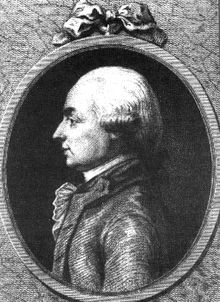J. Hector St. John de Crèvecœur
| J. Hector St. John de Crèvecoeur | |
|---|---|
 |
|
| Born | December 31, 1735 Normandy, France |
| Died | November 12, 1813 Sarcelles, France |
| Other names | Michel Guillaume Jean de Crèvecoeur |
| Occupation | Writer |
| Known for | Pro-American writings during the time of the American Revolution |
| Spouse(s) | Mehitable Tippet |
Michel Guillaume Jean de Crèvecœur (December 31, 1735 – November 12, 1813), naturalized in New York as John Hector St. John, was a French-American writer. He was born in Caen, Normandy, France, to the Comte and Comtesse de Crèvecœur (Count and Countess of Crèvecœur).
He was born December 31, 1735, in France. In 1755 he migrated to New France in North America. There, he served in the French and Indian War as a surveyor in the French Colonial Militia, rising to the rank of lieutenant. Following the British defeat of the French Army in 1759, he moved to the Province of New York, where he took out citizenship, adopted the English-American name of John Hector St. John, and in 1770 married an American woman, Mehitable Tippet. He bought a sizable farm in Orange County, New York, where he prospered as a farmer. He started writing about life in the American colonies and the emergence of an American society.
In 1779, during the American Revolution, St. John tried to leave the country to return to France because of the faltering health of his father. Accompanied by his son, he crossed British-American lines to enter British-occupied New York City, where he was imprisoned as an American spy for three months without a hearing. Eventually, he was able to leave for Britain.
In 1782, in London, he published a volume of narrative essays entitled the Letters from an American Farmer. The book quickly became the first literary success by an American author in Europe and turned Crèvecœur into a celebrated figure. He was the first writer to describe to Europeans – employing many American English terms – the life on the American frontier and to explore the concept of the American Dream, portraying American society as characterized by the principles of equal opportunity and self-determination. His work provided useful information and understanding of the "New World" that helped to create an American identity in the minds of Europeans by describing an entire country rather than another regional colony. The writing celebrated American ingenuity and the uncomplicated lifestyle. It described the acceptance of religious diversity in a society being created from a variety of ethnic and cultural backgrounds. His application of the Latin maxim "Ubi panis ibi patria" (Where there is bread, there is my country) to early American settlers also shows an interesting insight. He once praised the middle colonies for "fair cities, substantial villages, extensive fields...decent houses, good roads, orchards, meadows, and bridges, where an hundred years ago all was wild, woody, and uncultivated."
...
Wikipedia
